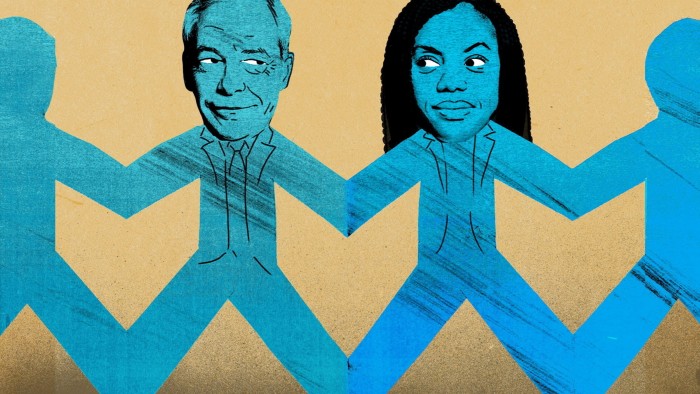Unlock the Editor’s Digest for free
Roula Khalaf, Editor of the FT, selects her favourite stories in this weekly newsletter.
If you haven’t heard it yet, don’t worry, you soon will. The calls to “unite the right” are about to become a drumbeat in British politics and a dominant soundtrack within Conservative party circles.
If next week’s local elections go as polls suggest, Nigel Farage’s Reform UK party will be confirmed as a serious political force, capable of winning council seats, mayoralties and parliamentary by-elections. The UK will have its own viable Maga party, set on superseding the Tories as the primary opposition to Labour.
Britain’s electoral system punishes diversity of choice. While on one side of the country’s political duopoly the vote has been split since Labour replaced the Liberals, the Tories always ensured their tent was large enough to eliminate meaningful competition on the right. Suddenly, that is over.
Opinion polls show a combined Tory and Reform vote share in the mid-forties, around double Labour’s current standing. Clearly, assuming that those votes are fungible would be false. But the fear among rightwingers is that, unless they find some way to co-operate by the next general election, the anti-Labour vote will split gifting Keir Starmer a second term.
Hence the calls to “unite the right”. For now these are limited to commentators and whispered informal conversations, though notably Robert Jenrick, last year’s beaten leadership contender, was caught talking privately about the need to end the division.
Jenrick, who sees immigration as the defining issue of the day, made clear his preference is to beat Reform by taking its territory. To that end, he has offered a string of hardline comments and policies on immigration, multiculturalism and an imagined Christian victimhood. But if Reform cannot be marginalised, he said, the division must end “one way or another”.
Don’t hold your breath. Any rapprochement is a long way off if it comes at all. For a start, these calls are coming only from Conservatives. After last year’s thrashing, they are languishing third in the polls. Reform, by contrast, is buoyant. Part of its argument is that the Tories are broken and indistinguishable from Labour. Farage is setting the political agenda for both the main parties, tapping into intense voter disillusion in the belief he can build a new anti-Labour force. He sees his party as the true heirs to Boris Johnson’s “red wall” Brexit coalition.
Neither side has any incentive to parley now. The two are in a battle for political territory akin to the Russians and western allies racing to occupy zones of influence at the end of the second world war. Any deal now would be on the wrong terms for someone. The Conservatives still have far more MPs than Reform and know that a pact would permanently embed a rival on the right. They hope that anti-Trump sentiment will deflate Farage or that his party could implode before the general election. Finally, the Reform leader’s history shows he is not a man who finds collaboration easy.
Farage, though, has momentum. Whether or not he believes his own rhetoric about superseding the Tories, he knows a deal struck now would make Reform the junior partner, perhaps quarantined to the nearly 90 seats where it is second to Labour.
Above all, it is not clear that Reform is really a party of the right. It definitely has rightwing attributes. It is socially conservative and anti-immigration. But its populist economics are veering left. Farage talks the free trade and low tax talk of liberal Brexiters but the party is Powellite and economically nativist. It supports some nationalisation and fetishises manufacturing. Its core supporters are heavily dependent on public services.
The Conservatives too are an ideological mess, torn between Thatcherite economics and rejecting globalisation. Kemi Badenoch is not wrong to say they need to work out their core beliefs — their ultimate agenda may yet prove very different to Reform’s.
For all this, “uniting the right” will become an increasingly insistent call. Were Badenoch to be ousted as leader, it would be the central issue of the fight to replace her.
Where the case for unity does hold water is if you accept that the right in British politics is realigning, as it has in the US. Many Tory MPs want to maintain their broad-based coalition. But another view perceives an ultimate choice between David Cameron’s more cosmopolitan, liberal, globalist voters and the socially conservative, suburban voters who coalesced around Brexit.
Few are clear on the form of any collaboration. It could range from a tacit electoral pact not to make an effort in each other’s target Labour seats to a formal German CDU/CSU style co-operation based on different geographic strengths. Jenrick has previously talked of the Canadian example, in which the old conservatives were absorbed by a newer Reform party. But that realignment took 13 years in opposition.
Both parties first need to know the electoral limits of going it alone. The Tories would be well advised to ditch all talk of pacts, which not only looks desperate but also marks a surrender before they have actually lost. They are not wrong to fear division. But even if an alliance is the final outcome, it is in both sides’ interest to try to smash each other first. They will treat the coming years as a primary — to establish who offers the stronger challenge to Labour. The right will not unite without a fight.




